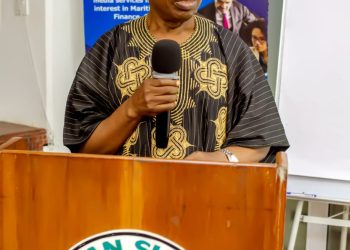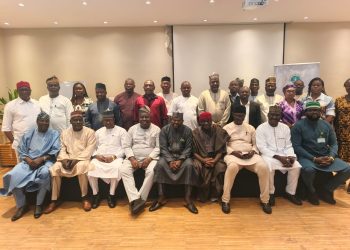NAGAFF ENDORSES PROPOSED NSC ACT REPEAL AND ENACTMENT BILL 2023
By Mcanthony Onuoha
National Association of Government Approved Freight Forwarders-NAGAFF says it is strongly in support of the Nigerian Shipper’s Council Act Repeal and Enactment Bill 2023 and hopes it is signed into law by President Bola Ahmed Tinubu GCFR.
In a position paper to the National Assembly, dated 4th of May, 2024 and personally signed by its National President, High Chief (Fwrd) Tochukwu Ezisi, NAGAFF stated the position of freight forwarders on the proposed bill while commending the efforts of the sponsors of the Bill to repeal the Nigerian Shipper’s Council Act (Cap N133,LFN,2004) and enact the Nigeria Shipping and Port Economic Regulatory Agency (NISPERA) Bill and Related Matters.
Part of the paper read,
“Our commendation is based on the fact that the post-concession era of Nigerian ports has suffered so
much topsy-turvy economic strangulation given the fact that there has not been an Economic
Regulatory Agency. Consequently, port concessionaires have been having a field day over the years, stifling economic/port operations to their economic advantages.”
“The post-concession challenges of Nigeria’s ports underscore the importance of establishing a dedicated regulatory agency to address issues and ensure fair and efficient operations within the ports and maritime sector.”
“We are optimistic that by repealing the existing legislation and enacting a new
bill to establish the Nigeria Shipping and Port Economic Regulatory Agency, there is an enormous opportunity to address longstanding issues and enhance oversight of port activities.”
“The support by NAGAFF and the larger freight forwarding community for this legislative initiative is an indication of our believe that the establishment of the regulatory agency will help address economic
strangulation and promote fair competition within the ports. We anticipate that the agency will play a crucial role in regulating the activities of port concessionaires, ensuring compliance with standards,
and fostering a conducive environment for economic growth and development within the port sector.
NAGAFF therefore endorses the bill as a mark of our commitment to advocating for measures that enhance transparency, efficiency, and competitiveness within Nigerian ports, ultimately benefiting stakeholders across the freight forwarding industry and the broader economy.”
“However , our submission today will not be complete without highlighting the key concerns of over one
hundred thousand (100,000) members of the Freight Forwarding industry that we represent nationwide. Freight forwarders play a crucial role in facilitating international trade by managing the logistics of transporting goods from one place to another. We are intermediaries between shippers, carriers,
Customs and other government agencies coordinating various aspects of the transportation process.”
“As the central player in the supply chain industry, Freight Forwarders contribute significantly to the
nation’s GDP by collecting revenue from shippers and remitting the same to the Nigeria Customs Service (NCS) and OGA in the form of duties, taxes, and levies on import and export trade. As of today,
records have shown that a cumulative of over ₦14 quadrillion was collected by Freight Forwarders and remitted to the Federal Government through NCS since 1989.”
“So , the Freight Forwarders’ position in the port economic configuration is strategic. The Freight Forwarders are the only stakeholders in the supply chain that understand the policies, processes, and practices of each institution, and as such our concerns about this bill should not be swept under the carpet, our concerns must be respected and serious considerations must be accorded to it during the technical review sessions afterward.”
“In the light of the above, we make the following observations and resolutions:
1) EXCLUSION OF FREIGHT FORWARDERS FROM REGULATORY POWERS OF THE NIGERIA
SHIPPING AND PORT ECONOMIC REGULATORY AGENCY (SECTION 4 (1C), PG C3307):
We ardently advocate for the exclusion of Freight Forwarders from the regulatory jurisdiction of the
Nigeria Shipping and Port Economic Regulatory Agency, as our sector is already regulated by the
Council for the Regulation of Freight Forwarding in Nigeria (CRFFN) under Act 16 of 2007.
This stance highlights the need for regulatory clarity and coherence within the shipping and port
industry. If freight forwarders are already subject to regulation by CRFFN, subjecting them to additional
oversight by NISPERA will lead to unnecessary duplication of efforts and regulatory burdens.
With this exclusion, there will be a streamlined regulatory framework that avoids redundancy and
ensures that regulatory responsibilities are appropriately allocated among relevant authorities. This approach can enhance efficiency, reduce administrative burdens, and promote better coordination and cooperation within the industry.
We want to be clear while effectively communicating this point to the National Assembly and all
stakeholders here present today for a regulatory environment that fosters the growth and competitiveness of the freight forwarding sector while ensuring compliance with necessary
regulations.
2) EXCLUSION OF SETTING TERMS, CONDITIONS, FEES, AND LICENSING OF FREIGHT
FORWARDERS (SECTION 4 (1I), PG C3308):
Considering that CRFFN already governs fees for the freight forwarding industry and accredits Freight
Forwarders, we strongly reject the inclusion of setting terms, conditions, fees, and licensing of Freight
forwarders by the Nigeria Shipping and Port Economic Regulatory Agency.
Our position here is in line with the importance of respecting the jurisdiction and expertise of
established regulatory bodies like CRFFN and ensuring that regulatory responsibilities are
appropriately allocated to foster the growth and competitiveness of the freight forwarding sector.
3) REPRESENTATION ON THE BOARD (SECTION 6 (1C & 1E), PG C3310):
We demand unequivocally the appointment of at least two Freight Forwarder nominated from the
National Association of Government Approved Freight Forwarders (NAGAFF) and Association of
Nigerian Licensed Customs Agents (ANLCA) as Executive Directors, and at least two Freight Forwarders
as part-time Board members to ensure robust representation and fair consideration of our industry’s
interests.
We have stated earlier that we are the only central players in the port ecosystem who understand the
policies, processes, and practices of each organization in the supply chain.
4) OPPOSITION TO THE 3% CHARGE ON IMPORT AND EXPORT CARGO (SECTION 28 (2C), PG
C3319):
We vehemently oppose the proposed imposition of a 3% charge on import and export cargo, as it
contradicts the fundamental objective of regulating tariffs, rates, and charges to prevent arbitrary
practices and breaches of the WTO Trade Facilitation Agreement.”
5) SUPPORT FOR REGULATION OF TARIFFS AND CHARGES (SECTION 36 (1A & 1B), PG C3323):
We strongly endorse the provision empowering the Agency to establish guidelines on tariffs, rates, and
charges, contingent upon thorough consultation with stakeholders.
6) MODIFICATION OF PENALTY FOR NON-COMPLIANCE (SECTION 37 (1&2), PG C3323):
We advocate for the implementation of a graded penalty system for non-compliance, encompassing
warnings, fines, and potential suspension, commensurate with the severity and recurrence of
violations.
7) MANDATORY JOINT COMMITTEE FOR TARIFF REVIEW (SECTION 37 (1&2), PG C3324):
We insist resolutely on the establishment of a mandatory joint committee comprising the Agency,
Freight Forwarders, and other stakeholders to oversee and ensure the fairness and transparency of
tariff reviews and adjustments.
We trust that these recommendations will be accorded the utmost consideration to facilitate the development of a Nigeria Shipping and Port Economic Regulatory Agency Bill that effectively addresses
the concerns of all stakeholders and fosters a just and efficient regulatory framework for the Nigerian
port sector.”




















